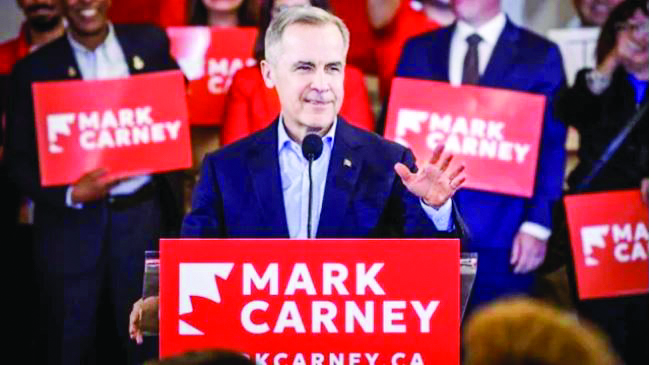Carney’s leadership faces global tension, domestic division, and energy crossroads—balancing sovereignty, security, and sustainability in a fractured world.
OTTAWA: Mark Carney’s minority government victory represents a pivotal moment in Canadian political history—a quiet nod from Canadians that competence, integrity, and international experience still matter. But with a slim mandate and an increasingly fractured global order, Carney faces the daunting task of navigating a geopolitical minefield, particularly the intensifying confrontation between the United States and China.
This isn’t just a matter of diplomacy. It is existential for Canada. As the U.S. barrels toward another Trump presidency, the rhetoric coming from south of the border isn’t just troubling—it’s veering into the absurd. Trump’s offhanded remarks about “annexing Canada for its resources” may sound like campaign-trail bluster, but beneath the bravado lies a chilling truth: the U.S. sees Canada less as an equal partner and more as a conveniently located warehouse of water, minerals, oil, and strategic stability.
Carney will need all his skills as a former central banker and G7 insider to stave off becoming collateral damage in the new Cold War between Washington and Beijing. China, too, continues its creeping influence campaign, using economic leverage, diaspora control, and elite capture to tilt the playing field. Canada, having long been willfully blind to Beijing’s tactics, must now wake up. PM Carney during the leaders debate emphasized that China is the biggest threat but his political and corporate ties to China both through his environmental evangelism and Brookfield Asset Management’s huge exposure to the Chinese real estate market and investments in green energy industry like solar and EV’s is immense.
He must now put all of that behind him as within the new world order, neutrality is not an option.
But perhaps Carney’s greatest challenge—and greatest opportunity—lies at home: how to chart a coherent path for Canada’s energy future that responds to both economic necessity and environmental urgency. In a minority parliament, this requires a rare form of leadership—humble enough to negotiate, but strong enough to withstand ideological rigidity.
Carney’s early pivot to embrace energy and resource extraction may surprise some of his green-leaning supporters. But it is a necessary correction. We are, after all, a northern nation. Our prosperity has long been tied to the responsible exploitation of natural resources—from Alberta’s oil sands to Saskatchewan’s uranium and Quebec’s hydroelectric power.
However, Carney is not retreating from climate commitments. Rather, he is grounding them in reality. He must make a huge pivot and call for massive investment in carbon-free sources—particularly nuclear, wind, and solar but reflects a pragmatic understanding that we can’t wish away fossil fuels without first building a viable and affordable clean energy that powers our industry with competitive advantage.
Canada must lead in small modular nuclear reactors, in Arctic wind grid integration, and in solar innovation adapted to our long winters. But that must be part of an integration that capitalizes on the resources that we and the world needs so our standards of living does not fall precipitously and our competitiveness erodes. But we must also secure critical minerals, develop LNG infrastructure to displace coal in Asia, and ensure energy sovereignty in a world that is no longer secure. These are solutions for energy and resources we can help Indian infrastructure and manufacturing with. A pivot on the Indo-Pacific strategy towards southern Asia is well overdue and the Asia Pacific Foundation has been leading from a policy perspective for about eighteen months. This after the disastrous leadership of that organization under now Senator Yuen Pau Woo.
This is where Carney’s background is an asset. He understands the interdependence of fiscal stability, energy security, and national resilience. He knows that you cannot tax or regulate your way to innovation as the party he now leads has done for ten long years. Canada needs to invest in it. And he must ensure that these investments are not gobbled up by foreign interests or leveraged by hostile regimes.
At the same time, Carney must address the populist wave cresting across the Western world. He must show Canadians that globalism does not mean giving away the farm—or the mine. He must protect Canadian ownership of our resources while partnering strategically with trusted allies.
Europe, India(Asia Pacific) and the United States are those allies.
Trump’s threats of tariffs and trade barriers are not just political theatre; they are signals of a reshaping global economy where loyalty will be measured in access. Canada must not simply be a junior partner in this equation. We must be indispensable to a prosperous North American economic zone that challenges China’s weaponization of forced labour, cheap coal and subsidized industrial strategies, whose only objective is to undermine our competitiveness.
Carney will need to forge a new national consensus—one that transcends climate ideology and embraces energy pragmatism; one that strengthens our institutions against foreign interference while rekindling public trust; and one that asserts Canadian sovereignty not with sabre-rattling, but with strength, clarity, and purpose.
Mark Carney has inherited a moment. Whether he becomes the steward Canada needs in this new age will depend on his ability to walk the razor’s edge—between the rising dragons of Beijing, the swaggering giants of Washington, and the very real demands of the Canadian people.
This is not just a political balancing act. It’s a national survival strategy.
Dean Baxendale is Publisher, CEO of the China Democracy Fund and co-author of the upcoming book, Canada Under Siege.

